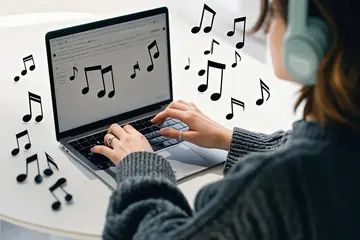As AI revolutionizes music creation, artists and producers face new questions about ownership and copyright. If you’ve used AI tools to compose original tracks, you might wonder: Can you copyright AI-generated music? The answer isn’t straightforward—but this guide breaks down the process, legal nuances, and best practices to protect your work.

Can AI-Generated Music Be Copyrighted?
Most jurisdictions, including the U.S. and EU, require human authorship for copyright protection. The U.S. Copyright Office (USCO) has ruled that purely AI-created works lack eligibility, but AI-assisted music (where humans curate, edit, or significantly modify outputs) may qualify.
Key Criteria for Copyright Eligibility:
Human Input: Your creative decisions (melody adjustments, lyrics, arrangement) must shape the final output.
Originality: The work should reflect unique human expression, not just AI automation.
Fixation: The music must be recorded in a tangible medium (e.g., audio file, sheet music).
How to Copyright AI-Generated Music: 5 Steps
1. Document Your Creative Process
Keep records of how you used AI (e.g., prompts, edits, software). Proving your role strengthens copyright claims.
2. Register with a Copyright Office
U.S. Filers: Submit via the USCO portal. Choose "Sound Recording" and "Musical Work" for full coverage.
EU/UK: Apply through IPO or EUIPO.
Note: Disclose AI involvement in your application to avoid future disputes.
3. Leverage Licensing
If your AI tool’s terms claim ownership (e.g., some free platforms), use royalty-free generators or negotiate licenses for commercial use.
4. Add Metadata
Embed copyright details (?, year, owner) in audio files and streaming platforms (e.g., DistroKid, CD Baby).
5. Monitor and Enforce
Use services like Content ID (YouTube) or Audible Magic to detect unauthorized use.
Legal Gray Areas
Collaborative AI: If multiple contributors (human + AI) are involved, define rights via contracts.
Public Domain: Some AI tools train on copyrighted material—verify outputs for accidental infringement.
Future of AI Music Copyright
Laws are evolving. The EU’s AI Act and U.S. court rulings may soon clarify ownership standards. Stay updated through legal advisories or industry groups like ASCAP or PRS for Music.
Final Tips
Consult a Lawyer: For high-value works, seek IP legal advice.
Label Clearly: Mark AI-assisted tracks as such to manage fan/listener expectations.
By understanding these steps, you can navigate the complexities of copyrighting AI-generated music while safeguarding your creative rights.
